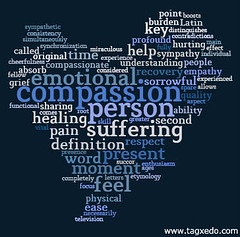Sometimes people who are emotionally sensitive are angry with themselves: angry because they feel different than other people, because they are easily hurt, and sometimes because they feel broken.
Perhaps they've heard that they are too sensitive or overreacting so often that they are angry with their sensitivity. Some emotionally sensitive individuals feel ashamed, like they are less than other people. Some are frustrated that their emotional reactions have gotten in the way of achieving their goals or have hurt relationships they valued. Sometimes there is a feeling of hopelessness and they have retreated from the world, seeing it as too painful.
The anger and shame that people sometimes feel about being emotionally sensitive adds to their suffering and their emotional pain. In addition, fearing being alone, left out or abandoned blocks the joy and pleasant experiences that might otherwise be available.
Our culture's focus on self-esteem, on being the best and/or gaining the approval of others, may add to the suffering of emotionally sensitive people. This focus encourages continual self-judgments and judgments of others. The emotionally sensitive may be particularly severe in their judgments of themselves.
People judge themselves harshly for various reasons. Some have learned from critical people in their lives, internalizing the messages they received so they now say the same negative statements to themselves. They have accepted the judgments of others as the truth. Some individuals may criticize themselves because they believe it will motivate them to do better, though in fact it tends to do the opposite. Others may berate themselves as a form of protection. Maybe if they judge themselves harshly, they can avoid the condemnation of others.
Neff suggests that we stop judging and evaluating ourselves as either good or bad and treat ourselves as kindly as we would a best friend. She encourages people to stop floccinaucinihilipilification, a very long word that means the habit of estimating something as worthless.
Neff asserts that our culture's emphasis on self-esteem is part of the problem of not liking one's self. Self-esteem is all about judging, an evaluation of our worthiness, derived from being good (or not) at doing things we value. For example, self-esteem could be based on being a good cook or an athlete or a scholar.
Self-esteem can also be based on what we perceive as the view others have of us. For emotionally sensitive people in particular, this can be a trap. Given the value our culture has placed on logical thinking, many emotional sensitive people may have a history of being judged negatively for their emotional reactions. This past experience can lead them to anticipate rejection by others and perhaps even believe been judged when they haven't.
A focus on self-esteem can foster the belief that your value as a person depends on your experiences at any given moment. Are you successful in what you are doing right now? Are others faster than you at running? Did you get an A on your last test? Are you more or less successful than the person sitting next to you? At this moment do you sense approval by those around you? Or is a friend angry with you?
Basing your self-worth on the approval or disapproval of others or on your success or failure in the moment leads to constant ups and downs in your view of yourself. With this focus, establishing a solid identity, knowing who you are as a person, would be difficult. In addition, the joy of doing what you love could be lost. Instead of focusing on the enjoyment of running, each race would be about your value as a person. So would evenings out with friends.
When focused on your value as a person, everyday situations become tests of your worth. For example, when going out with friends,you may find yourself promising to not react emotionally, because others judge you negatively for that. Then you use every ounce of self-control you have to push down your emotions until you are safe at home. Even when you succeed, you might later go over the evening in your head, criticizing yourself for each perceived failure. Or focusing on how your friends acted or what they said, fearful they were judging you.
Neff proposes that self-compassion offers an alternative to the focus on self-esteem. Self-compassion is a form of self-acceptance and would fit in the radical acceptance choice of the four options for what you can do when you face a problem (see previous post, No Matter What the Problem, There's Only Four Things You Can Do). We'll talk more about self-compassion in upcoming posts.



 Acceptance is accepting life on life's terms. Acceptance is also the idea of accepting yourself, with all your human imperfections. That means that instead of fighting your imperfections and your flaws, you accept them. What's the good in that? Well suffering consists of the pain in life that you have no control over, plus the upset and resistance you have about that pain, which you do have control over. If you stop resisting or avoiding the pain, then you lower your level of suffering.
Acceptance is accepting life on life's terms. Acceptance is also the idea of accepting yourself, with all your human imperfections. That means that instead of fighting your imperfections and your flaws, you accept them. What's the good in that? Well suffering consists of the pain in life that you have no control over, plus the upset and resistance you have about that pain, which you do have control over. If you stop resisting or avoiding the pain, then you lower your level of suffering.